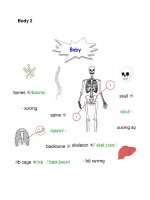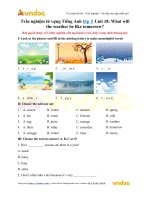TỪ VỰNG TOEIC unit 18
Bạn đang xem bản rút gọn của tài liệu. Xem và tải ngay bản đầy đủ của tài liệu tại đây (265.45 KB, 63 trang )
Unit 18
CAPIT ANTHROP KINE DYNAM GRAD REG CRIT JUR PENT QUINT
Number Words
Quiz 18-1 Quiz 18-2 Quiz 18-3 Quiz 18-4 Quiz 18-5 Review Quizzes 18
CAPIT, from the Latin word for “head,” caput, turns up in some important
places. The head of a ship is its captain, and the capital of a state or country
is where the “head of state” works. A capital letter stands head and shoulders
above a lowercase letter, as well as at the head (beginning) of a sentence.
capitalism
An economic system based on private
ownership, private decisions, and open competition in a free market.
• In the 1980s, the leaders of the free world had faith that capitalism and a
free-market economy would solve all our problems.
Capital is wealth—that is, money and goods—that's used to produce more
wealth. Capitalism is practiced enthusiastically by capitalists, people who use
capital to increase production and make more goods and money. Capitalism
works by encouraging competition in a fair and open market. Its opposite is
often said to be socialism. Where a capitalist economy encourages private
actions and ownership, socialism prefers public or government ownership
and control of parts of the economy. In a pure capitalist system, there would
be no public schools or public parks, no government programs such as Social
Security and Medicare, and maybe not even any public highways or police.
In a pure socialist system, there wouldn't be any private corporations. In other
words, there's just about no such thing as pure capitalism or pure socialism in
the modern world.
capitulate
To surrender or stop resisting; give up.
• At 2:00 a.m. the last three senators finally capitulated, allowing the bill to
move forward.
Capitulation often refers to surrender on the battlefield. Originally it only
referred to surrender according to an agreement, though that part of the
meaning is often absent. Today a teacher can capitulate to her students' cries
of protest against a homework assignment, or a father can capitulate to his
kids' pleas to stop for ice cream, when the only terms of the agreement are
that they'll stop complaining.
decapitate
make useless.
(1) To cut off the head; behead. (2) To destroy or
• The leaders of the uprising were decapitated, and their heads were mounted
on long poles on London Bridge as a warning to the people.
Decapitation is a quick and fairly painless way to go, so it was once
considered suitable only for nobles like Sir Walter Raleigh, Mary Queen of
Scots, and two of Henry VIII's unfortunate wives. The invention of the
guillotine in the 18th century was meant to make execution swifter and more
painless than hanging or a badly aimed blow by the executioner's sword.
recapitulate
important points or stages.
To repeat or summarize the most
• At the end of his talk, the president carefully recapitulated the main points
in order.
Capitulation originally meant the organizing of material under headings. So
recapitulation usually involves the gathering of the main ideas in a brief
summary. But a recapitulation may be a complete restatement as well. In
many pieces of classical music, the recapitulation, or recap, is the long final
section of a movement, where the earlier music is restated in the main key.
ANTHROP comes from the Greek word for “human being.” So an
anthropomorphic god, such as Zeus or Athena, basically looks and acts like a
human. And in Aesop's fables and many animated cartoons, animals are
usually anthropomorphized and behave exactly like furry, four-legged human
beings.
anthropoid
Any of several large, tailless apes.
• The chimpanzees, gorillas, orangutans, gibbons, and bonobos are all
classified as anthropoids.
With its suffix -oid, meaning “resembling,” the word anthropoid means
literally “resembling a human being.” Anthropoid apes are so called because
they resemble humans more closely than do other primates such as monkeys
and lemurs. Some even spend a good deal of time walking on their hind legs.
Anthropoids are, of course, highly intelligent (though maybe no more so than
many monkeys), and some of them use sticks and stones as tools. (But if you
call someone an anthropoid, you're probably not complimenting his
intelligence.)
anthropology
The science and study of human beings.
• By studying the cultures of primitive peoples, anthropology may give us a
better understanding of our own culture.
Anthropologists, those who study the whys and wherefores of human
existence, today look not only at the tribes of the Amazon but also at the
neighborhoods of Brooklyn or Santa Monica. Every group and every culture
now seems to be possible material for anthropology. Some anthropologists
specialize in the study of human evolution, some study human language,
some study archaeology, and some study human culture through the ages.
Unlike historians, they tend to focus less on what has been recorded in
writings than on what can be discovered in other ways.
misanthropic
Hating or distrusting humans.
• Few characters in literature are more misanthropic than Ebenezer Scrooge,
who cares for nothing but money.
Jonathan Swift was famous for the misanthropy of works such as Gulliver's
Travels which make fun of all kinds of human foolishness. But in spite of his
apparent misanthropic attitude, he spent a third of his income on founding a
hospital and another third on other charities—certainly not the acts of a true
misanthrope. Today we often use synonyms such as cynic and grinch for
misanthropic types—while hoping we don't meet too many of them.
lycanthropy
(1) A delusion that one has become a wolf.
(2) Transformation into a wolf through witchcraft or magic.
• The local farmers avoided the residents of the village in the next valley,
who had long been suspected of grave robbing and lycanthropy.
The Greek word for “wolf,” lykos, combines with the anthro- root to produce
the meaning “wolfman.” In European folklore, dating back to the ancient
Greeks and Romans, there are men who change into wolves at night and
devour animals, people, or graveyard corpses before returning to human form
at dawn. Werewolves, or lycanthropes, may be evil and possessed by the
devil, or may instead be the victims of a werewolf bite and thereby cursed to
change into wolf form at the full moon. The werewolf's evil intention is
shown by its eating only part of the animal or corpse, rather than all of it like
a truly hungry wolf.
Quiz 18-1
A. Fill in each blank with the correct letter:
a. misanthropic
b. capitalism
c. lycanthropy
d. capitulate
e. recapitulate
f. anthropology
g. decapitate
h. anthropoid
1. She's too proud to ___ to her rivals on this point without getting something
major in return.
2. In the years when new primitive cultures were being discovered regularly,
___ must have been a very exciting field.
3. ___ is the economic system in most of the world's countries today, but in
many of these the government also plays a large role.
4. The gorilla is classified as an ___ because of its relatively close
resemblance to humans.
5. The guillotine was used in France to ___ criminals before capital
punishment was outlawed there.
6. By the time he turned 80 he was genuinely bitter and ___ and disliked by
all his neighbors.
7. All the sports channels constantly ___ the highlights of recent games.
8. In these mountains, where wolves can be heard baying at the moon every
night, many of the villagers believe in ___.
Answers
B. Match the word on the left to the correct definition on the right:
1. recapitulate a. free-market system
2. misanthropic b. human-wolf transformation
3. capitalism c. surrender
4. anthropoid d. summarize
5. decapitate e. antisocial
6. anthropology f. study of cultures
7. capitulate
g. ape
8. lycanthropy h. behead
Answers
KINE comes from the Greek word kinesis, meaning “movement.” Kinetic
energy is the energy of motion (as opposed to potential energy, the kind of
energy held by a stretched elastic band). Kinetic art is art that has moving
parts, such as Alexander Calder's famous mobiles. And cinema, the art of
moving pictures, actually comes from the same kine- root as well.
kinesiology
The scientific study of human movement.
• With a kinesiology degree in hand, she landed a job as a rehab therapist for
patients following heart surgery.
Kinesiologists study the acquisition of motor skills, the mechanical aspects of
movement, and the body's responses to physical activity. A kinesiologist may
work in a public-school fitness program, design exercise programs for people
with and without disabilities, or work with patients recovering from disease,
accidents, and surgery. As a field of research, kinesiology focuses
particularly on the mechanics of muscular activity.
hyperkinetic
(1) Relating to or affected with
hyperactivity. (2) Characterized by fast-paced or frantic activity.
• Noises Off is a hyperkinetic stage farce that moves at a breathless pace for a
full hour and a half.
Since the prefix hyper- means “above, beyond” (see HYPER), hyperkinetic
describes motion beyond the usual. The word is usually applied to children,
and often describes the condition of almost uncontrollable activity or
muscular movements called attention-deficit/hyperactivity disorder (ADHD).
Kids with ADHD are usually not just hyperkinetic but also inattentive,
forgetful, and flighty. Though they're often treated with drugs, many experts
believe there are better ways of dealing with the problem. Lots of people now
shorten both hyperactive and hyperkinetic to simply hyper (“He's been hyper
all morning”), but usually don't mean it too seriously.
kinescope
tube.
A motion picture made from an image on a picture
• In the archives she turned up several kinescopes of Ernie Kovacs's 1950s
show, which she thought had been dumped into New York Harbor decades
ago.
Kinescope, originally a trademark for the cathode-ray tube in a TV, later
became the name for a film of a TV screen showing a live broadcast. In order
for a program to be seen beyond New York in the early days of TV, a
kinescope had to be shipped from station to station. Though grainy and fuzzy,
these were for a time the only way of capturing live shows. But in 1951 Desi
Arnaz and Lucille Ball decided to film their comedy show rather than to
broadcast it live, and in a few years live broadcast comedy and drama had
vanished from the airwaves.
telekinesis
The movement of objects without contact or
other physical means, as by the exercise of an occult power.
• Fascinated by telekinesis as a boy, he'd spent hours in his room trying to
push a pencil off the table using only his mind.
Tele- in Greek means “far off” (see TELE). The eternally appealing idea of
moving an object remotely, using only psychic powers, has had a long life in
films, TV shows, stories and novels, video games, and comics. But although
some researchers believe in the existence of telekinesis (also known as
psychokinesis), most scientists believe that any reported experiences have
been the result of fraud, wishful thinking, or naturally explainable events.
DYNAM comes from the Greek dynamis, meaning “power.” A dyne is a unit
used in measuring force; an instrument that measures force is called a
dynamometer. And when Alfred Nobel invented a powerful explosive in
1867, he named it dynamite.
dynamic
(1) Relating to physical force or energy. (2)
Continuously and productively active and changing; energetic or forceful.
• The situation has entered a dynamic phase, and what we knew about it last
week has changed considerably by now.
Dynamic is the opposite of static, which means “not moving or active.” So all
living languages, for example, are dynamic rather than static, changing from
year to year even when they don't appear to be. A bustling commercial city
like Hong Kong is intensely dynamic, constantly changing and adapting. A
dynamic relationship—for example, the relationship between housing values
and interest rates charged by banks—is one that changes all the time.
Unfortunately, the word has been used so much by advertisers that we tend to
forget its basic meaning.
dynamo
(1) A power generator, especially one that produces
direct electric current. (2) A forceful, energetic person.
• Even as they entered the power plant, the roar of the water covered the
sound of the immense dynamos.
The dynamo was introduced in 1832 to produce electricity for commercial
use. Like all later generators, the original dynamos changed mechanical
energy (produced by steam, which was itself produced by burning coal) into
electricity. The word is less used today than it once was, since it's often
applied only to generators that produced direct electric current (DC) rather
than alternating current (AC), which is now the standard. A human dynamo is
a person who seems to have unlimited energy, such as New York's legendary
mayor Fiorello La Guardia, whose forcefulness and vigor matched that of his
intensely dynamic city.
aerodynamics
(1) A science that studies the movement
of gases such as air and the way that objects move through such gases. (2)
The qualities of an object that affect how easily it is able to move through the
air.
• Early automobile designs were based on the boxlike carriages drawn by
horses, back when no one was even thinking about aerodynamics.
Aerodynamics began as a science around the time of the Wright brothers' first
manned flights. Since then, it's become important to the building not only of
aircraft and automobiles but also of rockets and missiles, trains, ships, and
even such structures as bridges and tall buildings, which often have to
withstand strong winds. An aerodynamic vehicle is one whose design helps it
achieve the greatest speed and most efficient use of fuel. But although we
might casually call any sleek car design aerodynamic, true aerodynamics is
practiced not by artistic product designers but instead by highly trained
scientists, and many people's lives depend on their work.
hydrodynamic
Having to do with the science that
studies fluids in motion and the forces that act on bodies surrounded by
fluids.
• Building levees to contain a flood presents complicated hydrodynamic
problems.
Bernoulli's principle, which is basic to the science of hydrodynamics, says
that the faster a fluid substance flows, the less outward pressure it exerts. It
shows the close relationship between hydrodynamics and aerodynamics
(which deals with the movement of air and other gases), since it can partly
explain how air will “lift” an airplane by the way it flows over the wings, and
how a spoiler helps keep a race car's wheels pressed to the ground as it
accelerates. Hydrodynamics is sometimes applied today in studying the
surface of the planets and even the stars. As used informally by boaters,
hydrodynamic often means “hydrodynamically efficient.”
Quiz 18-2
A. Choose the closest definition:
1. dynamo
a. powerhouse b. force unit c. time interval d. power outage
2. kinesiology
a. science of planetary motion b. atomic motion c. study of human
movement d. history of film
3. aerodynamic
a. glamorously smooth b. relating to movement through air c. using
oxygen for power d. atmospherically charged
4. telekinesis
a. moving of objects by mental power b. broadcasting of films c.
distant motion d. electronic control from afar
5. hyperkinetic
a. overgrown b. large-bodied c. intensely active d. projected on a
large screen
6. hydrodynamic
a. relating to moving fluids b. water-resistant c. relating to boats d.
relating to water
7. kinescope
a. light meter b. peep show c. early movie camera d. camera for live
TV
8. dynamic
a. explosive b. energetic c. excited d. dangerous
Answers
B. Indicate whether the following pairs have the same or different
meanings:
1. hydrodynamic / tidal
same ___ / different ___
2. hyperkinetic / overactive
same ___ / different ___
3. kinescope / motion-triggered camera
same ___ / different ___
4. aerodynamic / air-powered
same ___ / different ___
5. kinesiology / sports history
same ___ / different ___
6. dynamo / generator
same ___ / different ___
7. telekinesis / electronic broadcasting
same ___ / different ___
8. dynamic / electric
same ___ / different ___
Answers
GRAD comes from the Latin noun gradus, “step” or “degree,” and the verb
gradi, “to step, walk.” A grade is a step up or down on a scale of some kind,
and a gradual change takes place in small steps.









